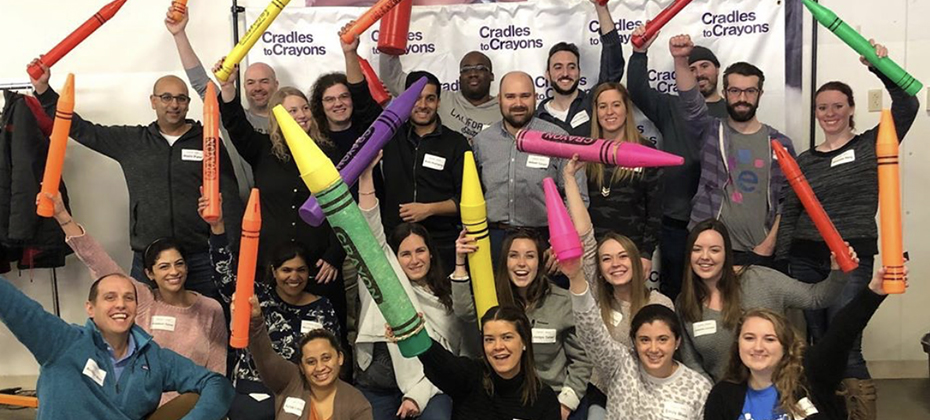World
News about Experian from all over the globe:

Here’s what we expect in 2021: Putting a Face to Frankenstein IDs: Synthetic identity fraud – when a fraudster uses a combination of real and fake information to create an entirely new identity – is currently the fastest growing type of financial crime. The progressive uptick in synthetic identity fraud is likely due to multiple factors, including data breaches, dark web data access and the competitive lending landscape. As methods for fraud detection continue to mature, Experian expects fraudsters to use fake faces for biometric verification. These “Frankenstein faces” will use AI to combine facial characteristics from different people to form a new identity, creating a challenge for businesses relying on facial recognition technology as a significant part of their fraud prevention strategy. “Too Good to Be True” COVID Solutions: With the distribution of vaccines underway and wider availability of rapid COVID-19 testing, Experian expects that fraudsters will continue to find opportunities to capitalize on anxious and vulnerable consumers and businesses. Everyone needs to be vigilant against fraudsters using the promise of at-home test kits, vaccines and treatments as means for sophisticated phishing attacks, telemarketing fraud and social engineering schemes. Stimulus Fraud Activity, Round Two: For Americans suddenly out of work or struggling with the financial fallout from the pandemic, 2020’s government-issued stimulus funds were a welcome relief, but also an easy target for fraudsters to commit scams. Experian predicts fraudsters will take advantage of additional stimulus funding by using stolen data from consumers to intercept stimulus or unemployment payments. Say ‘Hello’ to Constant Automated Attacks: Once the stimulus fraud attacks run their course, Experian predicts hackers will increasingly turn to automated methods, including script creation (using fraudulent information to automate account creation) and credential stuffing (using stolen data from a breach to take over a user’s other accounts) to make cyberattacks and account takeovers easier and more scalable than ever before. With billions of records exposed in the U.S. due to data breaches annually, this type of fraud will prosper in 2021 and beyond until the industry moves away from its reliance on usernames and passwords. Survival of the Fittest for Small Businesses: As a result of COVID-19, businesses were left with no choice but to quickly shift to digital to meet the needs of consumers, and some were more prepared than others. In 2020, consumers may have been willing to give businesses time to adjust to the new normal, but in 2021 their expectations will be higher. Experian predicts businesses with lackluster fraud prevention tools and insufficient online security technology will suffer large financial losses in 2021 and beyond. While fraudsters will iterate on new and old methods of attack in 2021, Experian is always innovating to help businesses stay one step ahead. As a leader in fraud prevention, Experian offers a full suite of automated fraud prevention and detection tools that harness data and analytics to make businesses more secure. To learn more, check out Experian’s fraud prevention solutions and download the Future of Fraud Forecast.

As our world becomes increasingly data-driven, the demand for automation will continue to grow. At Experian, we believe that harnessing the power of data can create opportunities for businesses to succeed and society to thrive. We’re proud to have a culture dedicated to continuous innovation and it’s one of the reasons we were selected as the winner of Cloudera’s 2020 Data Impact Awards in the Data for Enterprise AI Category. The award honors organizations that have built and deployed systems for enterprise-scale machine learning and have harnessed AI to automate, secure, and standardize decision making. Cloudera’s annual Data Impact Awards recognizes organizations whose data projects deliver significant benefits to their business and the broader community. Experian was granted the award for the work our Business Information Services’ Data Enrichment Team did to build and launch six different data maintenance applications, which allowed us to more quickly identify data inconsistencies through automation and machine learning. An example of this is Experian’s Velcro application, which is powered by machine learning. In real-time, it can help prevent and resolve duplicate records while also improving the customer experience. This is just one example of how Experian is investing in data-driven solutions to create a better tomorrow on the road to recovery ahead of us. As we head into the new year, we will continue to innovate using the most cutting-edge technologies to make an impact in the business communities we serve. The winners, which each represent innovation and leadership in their respective industry, were selected by a panel of distinguished thought-leaders and expert industry analysts. To learn more about this award win, visit https://blog.cloudera.com/2020-data-impact-award-winner-spotlight-experian/. You can view the full list of 2020 Data Impact Award winners here.

While there is no question the pandemic continues to create a challenging financial situation for millions of consumers, this is not the case for everyone. Because Americans are finding themselves in unique financial situations, there is not a one size fits all solution for maintaining access to the credit economy. As 2020 comes to a close and U.S. consumers and businesses grapple with another surge in COVID-19 cases, it is critical for the credit services industry to continually recognize and assess the impact the pandemic is having on consumer’s financial health. At Experian, our role is to help lenders understand consumer’s unique circumstances, so they know who they are talking to and what risk an applicant represents at any given time. We use the power of data, including traditional credit data, alternative data and consumer permissioned data, to accomplish this objective. I was recently invited to speak with Cheddar’s Nora Ali to share my views on the Road to Recovery from the pandemic, how we can maintain access to the credit economy and ways consumers can protect their credit standing and financial health during this time. You can watch the full interview here. I believe data is key to maintaining access to the credit economy and protecting consumer financial health, especially in environments like the one we currently find ourselves in.

For the eighth consecutive year, the Orange County Register has named Experian as one of the Top Workplaces, with the company securing the #1 ranking for the second time in three years. The award, which is based on employee feedback in a survey of hundreds of leading companies in Orange County, recognizes our company’s culture of innovation and inclusion, and our commitment to employees and communities during the pandemic. For more than 40 years, Orange County has been at the heart of our North America operations, and as we persevere through these challenging times, we are especially honored to be recognized for our dedication to maintaining a healthy, collaborative work environment and achieving higher performance while giving back. This award demonstrates the resilience, talent and compassion of all the people who work here at Experian. Since the start of the pandemic, we have further expanded our dedication to social good by creating new opportunities to support employees and the broader community. Because we are founded on a culture of innovating through bringing together technology and data, we were able to quickly respond to COVID-19 and honor our commitment to using data for good. Maintaining company culture All our decisions are driven by our desire to lead with empathy, and ensuring our employees feel valued and protected, while simultaneously mobilizing our resources to positively impact society, creating greater levels of financial and social inclusion. Although we had technology in place to easily initiate working remotely, we supported the transition to remote working by launching initiatives dedicated to mental and physical well-being, including a COVID-19 Resource Center, enhanced sick-leave policies, increased opportunities to ensure continuity of professional development, as well as an ASPIRE to be Well guide, in partnership with our Employee Resource Groups (ERGs). Giving back Throughout the pandemic, our employees have felt compelled to help clients who were facing unprecedented and unforeseen challenges. Different groups and employees of all levels began working together to develop new products and services to help clients, customers and communities persevere. This included free credit reports for small business, adding video streaming service payments to Experian Boost, hosting #CreditChat on social media, the Experian CORE heatmap, COVID-19 U.S. Business Risk Index , Experian® Health Payer Policy Alerts and updated fraud protections through the Business Resources Website. As part of our United for Financial Health initiative, we also launched two new partnerships with non-profit organizations to empower vulnerable consumers and those marginalized by the pandemic. In collaboration with Operation HOPE, we are helping vulnerable communities improve financial health with its data, analytics, products and services. Most recently, we partnered with NAACP Empowerment Programs to offer Home Preservation Grants to African Americans at risk of losing their homes. Although COVID-19 has been a source of stress and anxiety for businesses and individuals alike, we remain committed to helping employees reach their full potential and demonstrating that values and purpose do not change in a crisis. We are honored that the Orange County Register is recognizing our tireless efforts to make a difference in the communities in which we live and work.

Almost a year worth of a global pandemic has galvanized a past of relative stability and predictability, bringing chaos and disruption and signaling a different, certainly unexpected, future. As this future unfolds, it will be the actions that business leaders and their teams take now, amidst the crisis, that will determine the fate of their organization. Navigating the current complexity and change requires the ability to effectively address the urgent needs of the present, make immediate choices, and allocate resources. The pace is fast, and actions are decisive – in fact, companies have acted 20 to 25 times faster than expected since the coronavirus pandemic started, according to McKinsey[1]. Modern decision automation facilitates technology and business strategic alignment This search for increased nimbleness and improved strategic alignment has been a recurrent topic in our conversations with clients from around the globe. What we hear is that the pandemic has boosted their search for solutions that create synergies across technology and business groups and allow for an optimal use of their IT investments. As organizations are accelerating and driving their digital transformation, they are pursuing simpler fit-for-purpose solutions to lower their costs, drive internal alignment and operational efficiencies, and help them meet and exceed all-time high customer expectations in less time. Decision automation platforms such as Experian PowerCurve bring all those elements together, taking the complexity out of the customer decision making process. This crisis has accelerated the need for automated decision management solutions that are secure, can easily scale to meet emerging needs and changes in demand, and be upgraded seamlessly to avoid getting stuck on outdated software and unnecessary long and complex IT infrastructure overhauls. That sheer need for readiness has led to more, accelerated digital transformation. McKinsey Global Survey of Executives[2] shows that companies have accelerated the digitization of their customer and supply-chain interactions and of their internal operations by three to four years. Additionally, the share of digital or digitally enabled products in their portfolios has accelerated by seven years. These findings suggest that during the crisis, companies have prioritized refocusing their offerings to solve for the needs at hand rather than made huge leaps in product development in the span of a few months. With 60% of consumers having higher expectations[3] for their digital experience than before Covid-19, businesses big and small are acutely aware they must reshape their customer journeys to come out of this crisis reinforced. That requires the ability to access and manage more data sources, more attributes, more advanced analytics faster, more easily, and through a more consistent customer experience. It ultimately requires a platform that enables decision management in a digital world. In this regard, Forrester Research states in its new report; The Forrester Wave™: Digital Decisioning Platforms, Q4 2020[4], that “Experian’s PowerCurve really shines at keeping the leaders who are accountable for business results in control of decisioning by providing transparency into the decision logic and insight into actual results.” The capability to ingest and analyze high volumes of owned, third-party, and alternative data combined with seamless and flexible customer consent and protection enables faster, more effective and accurate credit decisioning, resulting in better risk management for the organization and better outcomes from clients. Technology has been fundamental in helping weather past crises and emerge stronger each time Of the hundreds of organizations currently using our decisioning software and platforms, some are prioritizing speed, like many community banks stepping up to support consumers going through hardship in a matter of weeks. Others such as Standard Chartered leverage Experian’s credit decisioning technology and machine learning capabilities to drive financial access in underbanked communities. For global financial institutions and leading retail brands, it’s all about regaining control over how and when they deploy the most relevant credit decisions and strategies while leveraging their existing data. They especially appreciate PowerCurve’s business-user-focused tools, which have received industry recognition[5] for the way they enable organizations to design strategies, including decision logic that can leverage machine learning models pretrained on prior customer behaviors. Many found in our cloud-based pre-configured data and decisioning capabilities the best way to solve for their customers’ immediate needs. It’s the case of AU Bank in India, where they leverage our standard, ‘out-of-the-box’ applications to accelerate their own transformation and continue to redefine the banking experience for consumers in the markets they serve. Other clients with sophisticated, decision-driven business processes prefer highly configurable solutions for their business-users to help them address specific needs. Personally, I feel energized by this challenge and excited about our commitment to helping more businesses find new ways to meet and exceed today’s consumer demands. Through our decisioning platform, organizations can listen to their customers, adapt their business models, adjust their offerings and innovate to drive a strong top line so they are better positioned down the road to recovery. Our decisioning solutions span the entire customer lifecycle and are used by credit and risk managers as well as developers to increase the knowledge about customer and market needs and be ready to solve today’s challenges and take on tomorrow’s opportunities. 1 McKinsey Global Survey of Executives, October 2020. 2 How COVID-19 has pushed companies over the technology tipping point—and transformed business forever. https://www.mckinsey.com/business-functions/strategy-and-corporate-finance/our-insights/how-covid-19-has-pushed-companies-over-the-technology-tipping-point-and-transformed-business-forever 3 Experian Global Insights Report September / October 2020 https://bit.ly/GIR_sep-otc 4 The Forrester Wave™: Digital Decisioning Platforms, Q4 2020 5 Experian’s profile, The Forrester Wave™: Digital Decisioning Platforms Q4 2020” Report.

There’s no question the COVID-19 pandemic is contributing to a unique 2020 holiday season, but there are consistent truths that remain when it comes to the holidays and personal finance. While the season is known for being merry and bright, sadly, financial challenges and stress are equally common for many this time of year. According to our latest holiday spending survey, 60% of consumers feel stressed about their finances during the holiday season and half feel the extra expense of the holidays makes them hard to enjoy. More than half (52%) say COVID-19 has caused credit or financial barriers which are preventing them from doing their shopping the way they had planned. At the same time, 62% agree holiday shopping puts a strain on their finances. In an effort to alleviate some of the financial stress some may be facing, I wanted to share three ways you can protect your financial health this holiday season and prepare for a financially healthy new year: Start with a budget and a plan. It’s easy to lose track of spending and take on unexpected debt during the holidays, which is why creating a budget is an important first step to protect your financial health. Experian research shows the average American plans to spend $775 on holiday gifts this season, but your holiday budget will depend on your unique financial situation. Outline how much you can realistically afford to spend and try to factor in expenses that are sometimes overlooked, which can be a challenge. In fact, our research found four out of five consumers often run into unexpected expenses they hadn’t planned for, including buying unexpected gifts (25%), gift wrapping supplies (25%) and mailing costs for sending gifts (21%). Once you’ve outlined your budget, creating a plan for who you need to shop for and where you’re going to shop can be a helpful next step. Our survey showed 62% of consumers plan to shop more online this year due to COVID-19. If you’re planning to do more shopping from the comfort of your home this year too, tracking online sales and promotions can help you save money, and factoring in shipping costs can help keep your holiday budget on track. Setting a budget and sticking to it, and having a shopping plan to avoid impulse buying will help keep you from falling victim to the pressure of overspending around the holidays. Use credit as a financial tool. Over half of shoppers say they will use credit cards and not cash when holiday shopping. This is an 8% increase from 2019. While using credit wisely is important all year, this is especially true around the holidays. The key is strategic use of credit – whether using a card that provides low interest, rewards points, or cash back – to improve the shopping experience and stretch your dollars. Over a quarter of people say they plan to open a new credit card for the holiday season, which is a 5% increase year-over-year. The top reasons for wanting to open a new card include seeking a promotional no annual percentage rate (APR) credit card, wanting to get a retail store discount, and maximizing spending by getting a card with cashback rewards. If you’re considering applying for a new credit card, improving your credit score can help you take advantage of the best credit offers this holiday season. Experian Boost allows you to get credit for paying your telecommunications, cell phone, utility bills, and streaming services payments on time. More than 4.9 million consumers have connected to the service since March of 2019 and about 61% of those who use Experian Boost see their scores improve. When you’re ready to explore credit card options, Experian’s free Credit Match program can help you find personalized credit card offers based on your unique credit history. Remember, credit is a financial tool, debt is a financial problem. Debt you can’t repay will certainly bring down one’s holiday spirit. If you don’t have a plan for paying off your credit card, using credit may not be a good idea. Protect your identity. The holidays may be the riskiest time of the year when it comes to identity theft and credit fraud. Identity thieves of all sorts are aware that consumers spend significantly more during the holiday season. While many of us are hunting or scrolling for the perfect gifts for friends and family, fraudsters are hard at work too. The number of consumers surveyed who have been identity theft victims during past holiday shopping seasons jumped to 24% from 12% in 2019. The holidays are always a ripe time for cybercriminals with the increased online traffic and this is especially true against the backdrop of COVID-19. To protect yourself from identity theft while shopping online, avoid using public WiFi networks, create strong passwords for your online accounts, and only shop on secure websites you are familiar with. If you are shopping at a store, be sure to cover your credit card information when you enter it, or your personal information if you are applying at the point of sale. Shoulder surfers can use their phones to take a quick photo or video to steal your identity. Also avoid leaving your purse or wallet, or any documents in your car. Identity thieves stalk parking lots looking for opportunity that is just a broken window away. Credit cards offer more protection for both online and in-person purchases than your debit card or cash, so consider using credit for your purchases. If fraud occurs, the money is not gone from your checking account and you can file a claim with your card issuer. Pay the balance in full right away to avoid interest charges. Checking your credit report often can help you spot fraudulent activity. You can get a free credit report from all three bureaus at AnnualCreditReport.com through April 2021. Identity theft monitoring is an easy way to monitor your financial accounts and credit report to identify possible fraud such as a credit card account opened in your name. While the holidays may look a little different this year when it comes to protecting your financial health the same rules still apply. For more information about how to protect your credit history in 2020 and beyond, visit www.askexperian.com or join our weekly CreditChat every Wednesday on Twitter at noon PST/3 p.m. EST.

2020 has been a year that has significantly impacted us all and the shockwaves are likely to challenge us for some time to come. One of the big disappointments for the data and tech industry is the postponement or cancellation of a number of major events – including the likes of Women in Data, which Experian was a proud Gold sponsor in 2019. Although we are not able to celebrate the Women in Data flagship event in person this year, we are thrilled to be an official partner of the very first WiD Week. This is a fantastic opportunity that will allow us to virtually gather together, support each other, and learn while in a safe online environment, driven by content that the Women in Data community needs right now. We are particularly excited to be hosting a session on Tuesday 24 November, which will focus on our support of Girls in Data. In this session, Experian’s Emily Capewell and Louise Maynard-Atem will be providing some thoughts on their involvement with the recent data challenge we hosted during the last lockdown. The data challenge was designed to help inspire young girls and boys to pursue a career in STEM. Louise will also be speaking on Thursday about her experience of 2020 and how we can action change as we head into 2021. This will be one of six short stories to mark Women in Data’s sixth birthday. We are extremely excited to be involved with WiD Week and while it will be slightly different this year, we hope our involvement can help empower and encourage more women into the data industry, supporting the next generation of data scientists who can help shape the future. You can find out more about WiD Week here.

For the past several years, Experian has been on a journey to help drive financial inclusion for millions of people around the world. This has required significant focus on how we operate, who we partner with, and the products and solutions we offer. Four years ago, when we decided to partner with and invest in Finicity, a leading financial data aggregator based in Salt Lake City, we did so on our strong belief in consumer-permissioned data and our shared vision with their leadership team. At the time, we knew Finicity’s commitment to empower consumers and drive the digital revolution fit perfectly with our priorities. Over the years, this has proven to be true time and time again as we’ve leveraged Finicity’s technology capabilities to create enormous opportunity for our clients and improve financial access for consumers. One example is our partnership on Experian Boost. With the support of Finicity’s infrastructure, more than 4.9 million consumers have connected to Experian Boost to contribute their on-time payments for their telecommunications, utility, streaming service and cell phones directly to their Experian credit reports. Through Experian Boost, and access to real-time consumer-permissioned data, we are increasing financial inclusion by helping lenders identify more consumers who can pay responsibly. In an equally powerful testament to the power of consumer-permissioned data, our partnership with Finicity is helping streamline the homebuying experience for consumers and lenders. As a distribution partner of Finicity’s Verification Solutions, we are delivering Verification of Assets (VOA), Verification of Income (VOI) and Verification of Income and Employment (VOIE) to the mortgage market. This innovative digitization of data and analytics is streamlining experiences for borrowers and is a critically important step in modernizing the mortgage process. Additionally, we have clients successfully utilizing Finicity’s Verification Solutions in automotive underwriting, personal lending, tenant screening and other sectors. Earlier this week, Mastercard closed its acquisition of Finicity. This move, along with the overall trajectory of market demand, is testament to the fact that we clearly invested in the right capability, the right team and the right vision at the right time. But our journey together isn’t over, it has just been reinforced and will continue with Finicity even under new ownership. Our commitment to working with Finicity does not change with this news, it is only enhanced. Our drive to accelerate digital lending, empower consumers and drive more consumer-permissioned data solutions is higher than ever. We will continue to partner with Finicity, now part of the Mastercard family, as a central component of our strategy. We look forward to a continued strong relationship with this new, combined entity as we continue to bring innovative solutions for consumers and businesses to the table.

Tens of millions of workers in the U.S. found themselves unemployed earlier this year, as the COVID-19 pandemic caused job loss rates not seen since the Great Depression. While average Americans were reaching out to their state agencies seeking assistance, fraudsters saw unprecedented opportunity. It may be difficult to imagine why someone would take advantage of a system striving to help those in need, but cybercriminals often thrive in times of crisis. At Experian, we took notice as we began to hear from states about a significant uptick in fraudsters wrongfully claiming benefits. When it comes to innovation, we strive to be agile and nimble so we can adapt to the changing needs of consumers and businesses. As a result of COVID-19, one of those emerging needs is to join the fight against unemployment insurance fraud. That’s why Experian has partnered with the Unemployment Insurance (UI) Integrity Center to help mitigate unemployment insurance fraud. Together, we will provide state agencies with a centralized platform to verify identities that are applying for unemployment insurance. The new partnership will combine Experian’s Precise ID® solution, which integrates identity analytics with advanced fraud risk models to distinguish various types of fraud, with the UI Center’s Identity Verification (IDV) capability. In short, when state agencies submit claims, the IDV solution will return ID theft scoring and associated cause codes, enabling them to assess whether a claim may be fraudulent. This can be easily implemented by any state UI agency through the Center’s Integrity Data Hub. While mitigating fraud is top of mind, security is a top priority as well. The platform was designed and built using the latest National Institute of Standards and Technology IT security standards to ensure the security of sensitive data. With the number of unemployment claims remaining high, it’s clear that state agencies must maximize their time and resources. Fortunately, the solution powered by Experian’s Precise ID will be available to state agencies at no cost through UI Integrity Center, operated by the National Association of State Workforce Agencies (NASWA) in partnership with and funded by the U.S. Department of Labor. This is one of many steps we’re taking at Experian to combat fraud, and we will continue to innovate and adapt on the road to recovery ahead of us. As we move forward together, Experian is committed to leveraging innovation and technology to protect consumers and help businesses meet the challenges of 2020 and beyond.